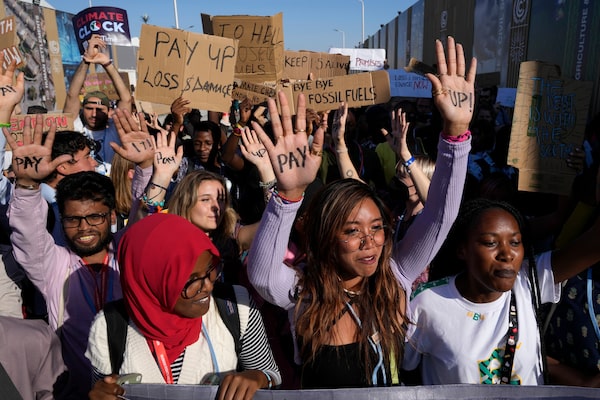If you’re reading this on the web or someone forwarded this e-mail newsletter to you, you can sign up for Globe Climate and all Globe newsletters here.
Good afternoon, and welcome to Globe Climate, a newsletter about climate change, environment and resources in Canada.
Online personality tests can be a fun way to better understand yourself. Like the Myers Briggs test, My Media created a personality test where you will be assigned a “climate warrior archetype.” You’ll also be given resources, guidance, and the opportunity to connect based on the mindset that you’re bringing to the table.
Check out their eight mindsets they identified in the climate movement, and of course, see which one best reflects you by taking their quiz.
Now, let’s catch you up on other news.
Noteworthy reporting this week:
- Mining and EVs: Nickel is the key to an electric vehicle transition. Is mining it making Canadians sick?
- Oil and Gas: How the U.S. became a global leader in LNG – and why Canada has fallen behind
- Analysis: Climate-related migration is on the rise in North America as extreme weather prompts people to move
- Arctic: Canada can’t properly detect threats, including illegal fishing or pollution from ships, Auditor-General’s report warns
- Rebuilding: As province touts reconstruction of flood-damaged Highway 8, many who live along it are still struggling to rebuild
- Canada’s Clean Fuels Fund: Ottawa rolls out $800-million in clean fuel funding
- From The Narwhal: A year after RCMP raids on Wet’suwet’en territory, the Coastal GasLink conflict isn’t going away
A deeper dive
COP’s purpose has a pulse that is slowly fading
Sierra Bein is the author of Globe Climate. For this week’s deeper dive, she rounds up our COP27 coverage.
COP27 managed to limp over the finish line Sunday morning with a commitment to launch a fund to compensate poor countries suffering from catastrophic climate-change events... but little else.
The negotiations in Egypt remained in deadlock late on Friday, the day the UN-sponsored climate conference was to finish, in spite of a late intervention by the European Union to help developing countries pay for the damages inflicted by catastrophic climate events with the so-called loss and damage fund. The talks were initially extended until Saturday.
Loss and damage refers to payments required for reconstruction after climate-related disasters, such as the floods that inundated a third of Pakistan last summer. Canada has supported the fund.
The last-minute breakthrough spared the COP27 event from total collapse. A last minute fight over emissions cutting and the overall climate change goal kept delaying a potentially historic deal.
“I am here to appeal to all parties to rise to this moment and to the greatest challenge facing humanity. The world is watching and has a simple message: stand and deliver,” urged UN Secretary-General Antonio Guterres.
The 1.5-degree goal may be officially alive even if a substantial temperature overshoot now appears inevitable, writes international Globe reporter Eric Reguly who attended the conference. The next COP, or the one after it, may declare it dead because the will, the money and the time to prevent the warming crisis from intensifying still appear to be lacking.
Environmental groups who saw the COP27 draft say the 1.5-degree goal is included but question whether it can be taken seriously.
In the end, if you ask Reguly, most delegates at the faltering climate conference in Egypt were struggling to ensure that COP27 was not the event where 1.5 dies in a cauldron of ever-rising, heat-trapping carbon emissions.
Canada at COP27:
- Government to decide between emissions cap and carbon pricing by spring, environment minister says at COP27. We also launched a group to lobby for more countries to use carbon pricing
- However, Canada won’t agree to back call for the phase-out of all fossil fuels to the final agreement
- Also: Trudeau to attend UN biodiversity summit in Montreal, despite the event’s official host China plan to send no invitations to world leaders.
More in COP27 news:
- The pavilion and the watermelon: How Ukraine made its COP27 climate conference display an anti-war message
- Opinion: Coal. The black, unbeatable monster at the Egyptian climate summit - and every other one
- Brazil’s Lula says administration to crack down on deforestation; EU tells COP27 it will increase climate ambition

Mitzi Jonelle Tan, center, of the Philippines, participates in a demonstration at the COP27 U.N. Climate Summit, Friday, Nov. 18, 2022, in Sharm el-Sheikh, Egypt.Peter Dejong/The Associated Press
What else you missed
- Will Doug Ford’s housing reforms kill the Toronto Green Standard?
- Elizabeth May pledges to turn down the heat within conflict-riven Green Party after becoming leader again
- Storm Nicole topples cherished PEI sandstone arch damaged by Fiona
- Repairing and rebuilding PEI’s unprecedented commercial damage post-tropical storm Fiona
- Indigenous Services Canada failing First Nations in response to wildfires, floods: report
- Canada falling behind as electric-vehicle sales pick up around the world
- Drought state of emergency lifted for B.C.’s Sunshine Coast, water restrictions stay
- World population hits 8 billion, creating many challenges
- Indonesia signs deals with major nations in bid to accelerate clean energy transition
Opinion and analysis
Marsha Lederman: Throwing stuff at art won’t save the planet
Robert Merasty: How will Canada build major energy projects again? The key is Indigenous ownership
Alex Bozikovic: Ford’s attack on the Greenbelt must stop. But who has a better idea?
Devin Todd: Negative emissions technologies are crucial if we are to limit global warming
Jatin Nathwani: Nuclear energy is key in solving our climate conundrum
The editorial board: How the oil industry can cut a lot of emissions, quickly and cheaply
Green Investing
Shareholders are pushing ESG issues despite troublesome economic environment, review shows
Shareholder pressure to improve environmental, social and governance performance shows no sign of letting up, especially with votes pushing for better corporate strategies on climate-change issues, according to a prominent proxy adviser. A review by Morrow Sodali shows that investors launched 113 ESG-related shareholder proposals at public companies between January and August of this year. Of those, 27 concerned environmental measures and the rest involved governance.
“We already have two large Canadian issuers that have done it, so the pressure will be on for others to follow, and next you’ll start seeing the TSX60 companies all doing this,” said Dexter John, chief executive officer of Morrow Sodali’s Canadian office.
- Listen to The Decibel: Can big banks save us from climate change?
- Do human rights get enough attention from ESG investors?
- Carbon Engineering secures millions from Airbus, Air Canada to scale carbon extraction technology
- Brookfield pledges up to US$700-million to invest in U.S. recycling companies
- Four TSX stocks with superior valuations well-placed for the energy transition
Making waves
Each week The Globe will profile a Canadian making a difference. This week we’re highlighting the work of Tino Dogo finding farming solutions to adapt to climate change.

Tino Dogo, co-creator of a vertical farming start-up named BadayaHandout
I’m Tino Dogo, 23, based in Winnipeg. I’m originally from Zimbabwe and moved to Canada for my BSc at University of Manitoba where I’m studying biology. As a student leader, I lead sustainability campaigns and advise sustainability policy on campus. I also advise on the Manitoba Government Youth Advisory Council on Climate.
I have a passion for finding business solutions to our climate crisis and after attending the accelerator program Press Start CoLab, I co-created a vertical farming start-up named Badaya, which comes from the Swahili word meaning future. My business partner, Elisha, and I recognise that industrial agriculture is particularly susceptible to climate change.
Badaya’s mission is to look at urban areas as viable places to cultivate food. We do this by growing leafy greens indoors, vertically and locally. We want to build environmentally efficient grow houses that are not susceptible to pests and the changing climate, which decreases resource degradation of rural areas. Badaya is hoping to achieve adaptive mitigation, find smart solutions to adapt, and prevent further warming.
- Tino
Do you know an engaged individual? Someone who represents the real engines pursuing change in the country? Email us at GlobeClimate@globeandmail.com to tell us about them.
Photo of the week

Oil Heads, climate activists from the Ocean Rebellion group, vomit mock oil as they demonstrate against the use of fossil fuels outside the offices of the International Maritime Organisation in London on November 21, 2022.DANIEL LEAL/AFP/Getty Images
Catch up on Globe Climate
- COP27 winding down, plus meet our new environment reporter
- A vibe check at COP27 in Egypt
- A postcard from Alberta’s Energy Transition Corridor road trip
- What Canada can learn from European energy planning
We want to hear from you. Email us: GlobeClimate@globeandmail.com. Do you know someone who needs this newsletter? Send them to our Newsletters page.
 Sierra Bein
Sierra Bein